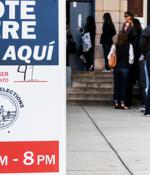Security News

If an AI breaks the rules for you, does that count as breaking the rules? This is the essential question being taken up by the Federal Election Commission this month, and public input is needed to curtail the potential for AI to take US campaigns off the rails. Future uses of AI by campaigns go far beyond deepfaked images.

The District of Columbia Board of Elections is currently probing a data leak involving an unknown number of voter records following breach claims from a threat actor known as RansomedVC. DCBOE operates as an autonomous agency within the District of Columbia Government and is entrusted with overseeing elections, managing ballot access, and handling voter registration processes. "We have successfully breached the District of Columbia Board Of Elections and have gotten more than 600k lines of USA Voters," the threat actor says.

Šimečka and Denník N immediately denounced the audio as fake. The fact-checking department of news agency AFP said the audio showed signs of being manipulated using AI. But the recording was posted during a 48-hour moratorium ahead of the polls opening, during which media outlets and politicians are supposed to stay silent.

Šimečka and Denník N immediately denounced the audio as fake. The fact-checking department of news agency AFP said the audio showed signs of being manipulated using AI. But the recording was posted during a 48-hour moratorium ahead of the polls opening, during which media outlets and politicians are supposed to stay silent.

In the 2024 presidential election campaign, you can bank on the appearance of AI-generated personalized fundraising emails, text messages from chatbots urging you to vote, and maybe even some deepfaked campaign avatars. A candidate could use tools enabled by large language models, or LLMs-the technology behind apps such as ChatGPT and the art-making DALL-E-to do micro-polling or message testing, and to solicit perspectives and testimonies from their political audience individually and at scale.

Four US citizens have been accused of working on behalf of the Russian government to push pro-Kremlin propaganda and unduly influence elections in Florida. The indictment follows earlier charges last year [PDF] against Moscow resident Aleksandr Viktorovich Ionov, two unnamed Russian Federal Security Service agents, and four unnamed Americans for their roles in recruiting US political groups to sow discord and division among voters, and push, among other fringe ideologies, California's secession from the US. It's claimed this same group of FSB agents also funded and directed the political campaign of a particular candidate for office in St Petersburg, Florida, in 2019, we're told.

The head of both US Cyber Command and the NSA, Gen. Paul Nakasone, broadly discussed that first organization's offensive cyber operations during the runup to the 2022 midterm elections. "We did conduct operations persistently to make sure that our foreign adversaries couldn't utilize infrastructure to impact us," said Nakasone.

Russian disinformation didn't materially affect the way people voted in the 2016 US presidential election, according to a research study published on Monday, though that doesn't make the effect totally inconsequential. Boffins from New York University, University of Copenhagen, Trinity College Dublin, and Technical University of Munich analyzed more than 700,000 social media posts in April and in October 2016 from Twitter accounts associated with the Internet Research Agency, a Russian influence operation.

Over the years, there has been a long-standing narrative that foreign state-sponsored threat actors present the most significant cyber threat to the election process. The threat actors also targeted devices belonging to the state boards of elections, state secretaries of state, and organizations that supported election infrastructure to steal voter data.

In this interview for Help Net Security, James Turgal, VP of Cyber Risk, Strategy and Board Relations at Optiv, talks about election cybersecurity and how to keep elections and electoral campaigns safe. After the results of the most recent presidential election was almost overshadowed by so-called "Election deniers" and those who continue to claim fraud in the votes cast, all eyes are on the midterm elections in November.